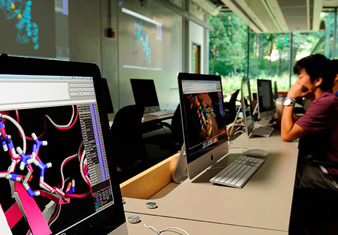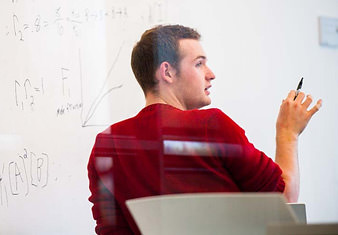
A Network of Support
Helping students succeed in an academically rigorous environment.
This past year saw an expansion of investments and efforts to help students succeed in an academically rigorous environment.
In fall 2013, an early alert system called HopReach was piloted across 13 courses in the Krieger and Whiting schools, with a particular focus on the large gateway sciences courses taken by hundreds of freshmen. The program allows professors to raise concerns about those who need additional support throughout the semester rather than waiting for students to end up in academic distress and perhaps probation. The system also empowers advisers to share relevant information and identify and intervene sooner on behalf of these students. The success of the pilot program in the schools of Arts and Sciences and Engineering led to its expansion to dozens more classes in the 2015 academic year.

The program allows professors to raise concerns about those who need additional support throughout the semester rather than waiting for students to end up in academic distress and perhaps probation.
At the same time, the university has been expanding other tools to support our undergraduates. The JUMP initiative focuses on promoting the success of underrepresented racial minorities and first-generation and low-income college students pursuing careers in the medical field. The two-year program provides targeted academic and social support consisting of a pre-orientation program, assignment of a student peer mentor, supplemental advising, networking, and enhanced programming opportunities throughout the year. The freshman retention rate for participants in the JUMP program was 100 percent in 2011 and 2013, and 98 percent for 2012. This past year, the program was expanded to include sophomores.
Over the last five years, the overall freshman retention rate rose from 96.9 percent to 97.1 percent, and the six-year graduation rate rose from 92.0 percent to 93.9 percent. As ongoing interventions continue and new ones are introduced, the university has set a goal of achieving 98 percent for its overall freshman retention rate and 96 percent for its six-year graduation rate. All with an eye to making sure we do all we can not to lose any of our promising and devoted young scientists.


